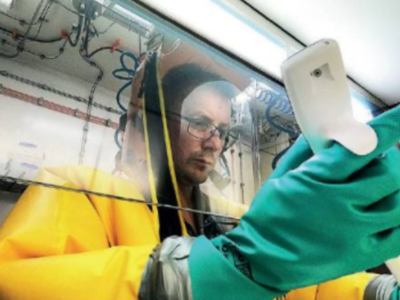Top Searches
- News
- City News
- bengaluru News
- IISc’s warm vax: Lab trials prove encouraging
IISc’s warm vax: Lab trials prove encouraging

A scientist at CSIRO’s high containment centre in Geelong, Victoria
BENGALURU: A ‘warm’ vaccine formulation developed by scientists at IISc in conjunction with biotech firm Mynvax is effective against all current SARS-CoV-2 variants of concern, an independent evaluation of the formulation conducted by CSIRO, Australia has shown.
CSIRO, which conducted animal tests for the Oxford-Covishield vaccine candidate last year, found that the ‘warm’ vaccine helps produce antibodies that neutralise all current variants of the novel coronavirus.
The findings were published on Thursday in the peer-reviewed ACS Infectious Diseases journal. This will pave the way for clinical development of the vaccine, leading to human trials. The study was led by Prof Raghavan Varadarajan of IISc. TOI first reported about the vaccine in November 2020.
As per the paper, researchers have shown the formulation triggered a strong immune response in mice, protected hamsters from the virus, and remained stable at 37°C for a month and at 100°C for up to 90 minutes — living up to its ‘warm vaccine’ tag.
Most vaccines currently in use require refrigeration to remain effective — Oxford-AstraZeneca must be stored at temperatures between 2 and 8°C; Pfizer requires specialised cold storage at -70°C.
The IISc-Mynvax vaccine has been designed by genetically engineering a domain of the S-Protein, called the receptor binding domain (RBD), of the SARS-CoV-2 virus. This domain attaches itself to the Ace2 receptor on the surface of target cells in the human respiratory tract which enables the virus to enter the body and cause the infection. The S-Protein of the virus is about 1,300 aminoacids long, but the vaccine focuses only on a string of 200 amino acids.
Human trials
On the next course of action, Varadarajan said they have applied to the government for grants/funds for Phase-I/II and Phase III human trials in India.“We would require at least Rs 30 crore for the trials, and all I can say at this time is that funding has been applied for,” Varadarajan told TOI, adding that the results from the live virus tests by CSIRO were very encouraging. He said CSIRO played a key role.
“CSIRO scientists at the Australian Centre for Disease Preparedness in Geelong contributed to the study by assessing vaccinated mice sera (blood samples) for efficacy against key coronavirus variants, including the Delta variant currently spreading globally including in Sydney,” CSIRO said in a statement shared with TOI.
Prof SS Vasan, CSIRO’s Covid-19 project leader and co-author, said vaccinated mice showed a strong response to all variants of the live virus. “Our data shows that all formulations tested result in antibodies capable of consistent and effective neutralisation of the Alpha, Beta, Gamma and Delta SARS-CoV-2 variants of concern,” he said.
Vasan told TOI in an exclusive telephonic interview: “CSIRO will continue to work with IISc to develop therapeutic applications that will complement vaccination strategies. The lack of safe, effective and affordable therapies that specifically targets this virus is an urgent and unmet need.”
CSIRO, which conducted animal tests for the Oxford-Covishield vaccine candidate last year, found that the ‘warm’ vaccine helps produce antibodies that neutralise all current variants of the novel coronavirus.
The findings were published on Thursday in the peer-reviewed ACS Infectious Diseases journal. This will pave the way for clinical development of the vaccine, leading to human trials. The study was led by Prof Raghavan Varadarajan of IISc. TOI first reported about the vaccine in November 2020.
As per the paper, researchers have shown the formulation triggered a strong immune response in mice, protected hamsters from the virus, and remained stable at 37°C for a month and at 100°C for up to 90 minutes — living up to its ‘warm vaccine’ tag.
Most vaccines currently in use require refrigeration to remain effective — Oxford-AstraZeneca must be stored at temperatures between 2 and 8°C; Pfizer requires specialised cold storage at -70°C.
The IISc-Mynvax vaccine has been designed by genetically engineering a domain of the S-Protein, called the receptor binding domain (RBD), of the SARS-CoV-2 virus. This domain attaches itself to the Ace2 receptor on the surface of target cells in the human respiratory tract which enables the virus to enter the body and cause the infection. The S-Protein of the virus is about 1,300 aminoacids long, but the vaccine focuses only on a string of 200 amino acids.
Human trials
On the next course of action, Varadarajan said they have applied to the government for grants/funds for Phase-I/II and Phase III human trials in India.“We would require at least Rs 30 crore for the trials, and all I can say at this time is that funding has been applied for,” Varadarajan told TOI, adding that the results from the live virus tests by CSIRO were very encouraging. He said CSIRO played a key role.
“CSIRO scientists at the Australian Centre for Disease Preparedness in Geelong contributed to the study by assessing vaccinated mice sera (blood samples) for efficacy against key coronavirus variants, including the Delta variant currently spreading globally including in Sydney,” CSIRO said in a statement shared with TOI.
Prof SS Vasan, CSIRO’s Covid-19 project leader and co-author, said vaccinated mice showed a strong response to all variants of the live virus. “Our data shows that all formulations tested result in antibodies capable of consistent and effective neutralisation of the Alpha, Beta, Gamma and Delta SARS-CoV-2 variants of concern,” he said.
Vasan told TOI in an exclusive telephonic interview: “CSIRO will continue to work with IISc to develop therapeutic applications that will complement vaccination strategies. The lack of safe, effective and affordable therapies that specifically targets this virus is an urgent and unmet need.”
FacebookTwitterLinkedinEMail
Start a Conversation
end of article
